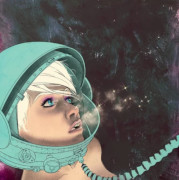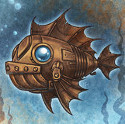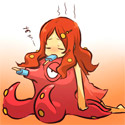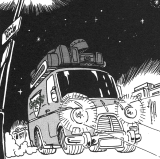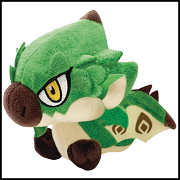|
Halloween Jack posted:1. I don't think player factions were an innovation leading to splatbooks; splatbooks themselves were the innovation. Vampire's Clans and Disciplines were essentially the replacement for D&D's character classes to give the game some structure. And then you have Rifts, which had tons of splatbooks while defining characters by classes. The historical throughline for player factions, as I understand it, is Runequest cults --> Ars Magica Houses --> Vampire Clans
|
|
|
|

|
| # ? May 23, 2024 10:20 |
|
Plutonis posted:lol I didn't knew Paradox Interactive started as the Subsidiary of a Subsidiary. They should have bought KULT instead of WoD to go full circle. It's not exactly that. I'm a little fuzzy on the details, but the entire thing goes something like this: Target Games were a successful Swedish gaming company, sort of a local TSR + Games Workshop. They ran their own stores, had their own magazine, published role, board and computer games. They had a subsidiary named Target Interactive which made computer games, mostly bad games but they sold reasonably. I guess the most notable is Svea Rike, which was based on a popular Swedish 90s board game and formed a sort of template for Europa Universalis and friends. When Target Games went bankrupt because the 90s were a bad time, Target Interactive was the only profitable part. The entire organization was restructured as Paradox Entertainment, with the former Interactive as the main business unit, renamed Paradox Interactive. 5 years later Fredrik Malmberg -- one of the founders behind Target Games, the one who used to work for Chaosium and got them their sweet licensing deals by being buddies with Greg Stafford -- bought the Conan IP and decided that he wanted to focus on his IP business. He moved to Los Angeles and decided he wanted Paradox Interactive to borrow money to scale up to a AAA dev working on his Conan stuff, while he did cool movie things. The Paradox Interactive CEO really did not want to do that, and wanted to keep making games with maps in them. So Interactive bought themselves out to become independent and Malmberg decided to use Funcom to make his AAA Conan games.
|
|
|
|
Ah interesting, so Paradox and the Age of Conan/ Conan Exile studio have the same lineage?
|
|
|
|
Halloween Jack posted:1. I don't think player factions were an innovation leading to splatbooks; splatbooks themselves were the innovation. Vampire's Clans and Disciplines were essentially the replacement for D&D's character classes to give the game some structure. And then you have Rifts, which had tons of splatbooks while defining characters by classes. I think I'm just using a more limited definition of splatbook. I was thinking of splatbooks as specifically related to directly character relevant groups/divisions/options. For instance, I would consider the brick colored D&D class books to be splatbooks, but Rifts worldbooks or Mystara Gazetteers not to be. If we widen the lens to worldbooks then that trend seems to have really got started in the late 1980s with Forgotten Realms and others. Either way, the concept really got supercharged by Vampire. Halloween Jack posted:4. Mechanically the biggest change was dice pools. drat near everything used a dice pool, though they didn't all use it the same way. Shadowrun had you roll your Skill as a pool of exploding d6s against a target number, White Wolf used a Stat+Skill pool of d10s counting successes over a target number, West End had you roll a pool of d6s and add up the result against a target number, and I forget how LUG's system worked exactly. There we go. Bullseye. This was exactly the kind of major innovation I knew I was missing from my list. Again, a major innovation probably pushed to the forefront by White Wolf but definitely the most popular resolution system for RPGs made in the nineties. Halloween Jack posted:5. LARP became a big deal. I hadn't considered that since it rarely came up for me or the people I gamed with. That makes sense. Xerophyte posted:neat history of the Swedish market That is neat stuff. I hadn't considered that the trends I was thinking of would be localized rather than an international thing, but that makes more sense in retrospect. For instance: Xerophyte posted:I think one weird thing that almost all the Swedish games of the time did is that it was absolutely standard to be able to randomly roll everything about a character. Gender, job, ethnicity, nationality, race, economic background, starting skills, attributes, personality, appearance, etc would have roll tables in character creation and you were encouraged to go for it unless you had a particular reason not to. You could end up playing a geriatric, illiterate thrall with a clubfoot and fear of bees in your Viking session, without any particular intention to do any of that, and this was considered OK. Having some sort of combat balance was not generally considered a design goal in the games I associate with the decade; having combat was generally considered optional. That kind of randomness seems like a trend that really peaked in the early 1980s in America. As for limited character progression, I don't know that it specifically had a heyday in America. Some games (Traveller) have been that way since the beginning of the hobby. I would actually agree that the trend toward 'mature' themes seems to have been driven more by the European markets. The aforementioned SLA Industries was Scottish, Kult was Swedish and the whole grimdark aesthetic was pushed by Warhammer and Mutant Chronicles. It definitely had a strong presence in America, though. I also find it interesting that the scene was never really dominated to the same degree that America was by D&D. If anything, the nineties was the low point for D&D's influence on the hobby in America and it was still the market leader for likely the first half of the decade. I think the overall weakness and lack of innovation in D&D at this time probably opened up the market for a bunch of second tier publishers to tear a place for themselves. Examples like AEG, Eden Studios or Dream Pod 9 seem like examples of companies that came out of a fragmented market without an overwhelmingly dominant force.
|
|
|
|
I'd say another iconic thing of 90s design was merit-flaw purchasing at character generation as a way either for players to indicate to the GM "this is the area of my character's plot that I want you to mess with, please", or for the system to drive players towards coming up with interesting backstory.
|
|
|
|
Three things that also come to mind with 90s RPGs are: As part of the popular themes of the era, playing as a cool, exclusive elite. Vampires, members of a secret government conspiracy, etc. Continuing a theme from the 1980s, skill bloat was a problem. Tie-in novels became a thing as companies tried to make RPGs a more profitable endeavour. The prime example is Dragonlance, but VTM also had a fair number of them. Itís much the same drive as VTMs eleventy billion splatbooks, which were motivated by getting people to buy lots of books to make money in a pretty unprofitable business.
|
|
|
|
Thank you for the Swede-posts! Does anyone have a hard copy of Fragged Empire they're willing to part with? They're going for scalper prices and my crew are three sessions into a Fragged Seas campaign, which is unfortunately impossible to divorce from the core book. I'd be happier paying high prices if I knew it were going to a goon, and I can promise the book would be going to a place it'll see heavy play. 
|
|
|
|
Haystack posted:The historical throughline for player factions, as I understand it, is Runequest cults --> Ars Magica Houses --> Vampire Clans Edit: For comparison, I don't consider AD&D's druid circles and thieves' guilds meaningful factions. Halloween Jack fucked around with this message at 17:41 on Feb 19, 2021 |
|
|
|
LatwPIAT posted:Three things that also come to mind with 90s RPGs are: Hello, Over the Edge, which manages several layers of exclusive elite at once. And also did FATE before FATE, which is neat.
|
|
|
|
EverettLO posted:I think I'm just using a more limited definition of splatbook. I was thinking of splatbooks as specifically related to directly character relevant groups/divisions/options. For instance, I would consider the brick colored D&D class books to be splatbooks, but Rifts worldbooks or Mystara Gazetteers not to be. If we widen the lens to worldbooks then that trend seems to have really got started in the late 1980s with Forgotten Realms and others. Either way, the concept really got supercharged by Vampire. quote:There we go. Bullseye. This was exactly the kind of major innovation I knew I was missing from my list. Again, a major innovation probably pushed to the forefront by White Wolf but definitely the most popular resolution system for RPGs made in the nineties. Example: In Dream Pod 9's Silhouette system, you roll your Skill as a dice pool, taking the highest, and adding your Attribute as a flat bonus to the total. For Jovian Chronicles, they recommended flipping the role of Attributes and Skills so that Attributes would be more important. It doesn't take a lot of number crunching to figure out that once you have 2d in your pool, a flat +1 is better than another die! quote:I would actually agree that the trend toward 'mature' themes seems to have been driven more by the European markets. The aforementioned SLA Industries was Scottish, Kult was Swedish and the whole grimdark aesthetic was pushed by Warhammer and Mutant Chronicles. It definitely had a strong presence in America, though.
|
|
|
|
Plutonis posted:Ah interesting, so Paradox and the Age of Conan/ Conan Exile studio have the same lineage? Nah. Funcom are currently owned by Tencent, but started as an independent Norwegian point-and-click game dev. No historical connection to Target/Paradox that I'm aware. It's just that when Paradox Interactive decided to buy their independence in 2004 rather than switch to making AAA Conan games then Malmberg's Paradox Entertainment licensed Conan to Funcom instead. EverettLO posted:I would actually agree that the trend toward 'mature' themes seems to have been driven more by the European markets. The aforementioned SLA Industries was Scottish, Kult was Swedish and the whole grimdark aesthetic was pushed by Warhammer and Mutant Chronicles. It definitely had a strong presence in America, though. Mutant Chronicles is one I have a hard time divorcing from my own nerd opinions. It was absolutely reviled by hobby veterans here. Target Games took the '84 and '89 Mutant RPGs and dropped the relatively down to earth post apocalyptic setting to make an entirely different sci-fi game, with an entirely different 40k aesthetic, while still keeping the Mutant name. Their existing Mutant player base loathed it with a passion no D&D edition war will ever approach. Still, clearly it was successful enough to launch internationally so someone here must have found it attractive enough to play. Target tried very hard to make a multimedia franchise out of Chronicles: they launched wargames, WH-style figurines, CCGs, SNES games, etc. The only one I remember actually enjoying was the Siege of the Citadel boardgame. I'm not really sure how successful or influential it was internationally but I believe the entire line failed to live up to Target's ambitious sales expectations and largely contributed to their collapse. Incidentally, the shambling corpse of Target/Paradox Entertainment and Fredrik Malmberg still have the rights to Mutant Chronicles, along with the original Mutant. The reportedly terrible 2008 Chronicles movie -- I haven't subjected myself to it -- was the first one Malmberg got made after moving to Los Angeles to be a media IP mogul.
|
|
|
|
Xerophyte posted:Nah. Funcom are currently owned by Tencent, but started as an independent Norwegian point-and-click game dev. No historical connection to Target/Paradox that I'm aware. It's just that when Paradox Interactive decided to buy their independence in 2004 rather than switch to making AAA Conan games then Malmberg's Paradox Entertainment licensed Conan to Funcom instead. It was popular enough for Modiphius to license the rights to remake it in 2D20. They did a full line for it, it's quite good, I have it all on my shelves.
|
|
|
|
Xerophyte posted:Mutant Chronicles is one I have a hard time divorcing from my own nerd opinions. It was absolutely reviled by hobby veterans here. Target Games took the '84 and '89 Mutant RPGs and dropped the relatively down to earth post apocalyptic setting to make an entirely different sci-fi game, with an entirely different 40k aesthetic, while still keeping the Mutant name. Their existing Mutant player base loathed it with a passion no D&D edition war will ever approach. I knew a very little bit of this but I always assumed there was some kind of tie in between the post apocalyptic Mutant games of the 1980s and Mutant Chronicles. Was it really just a total cash grab to turn existing name recognition toward capturing the Warhammer crowd? If so, that's amazingly brazen. Halloween Jack posted:Something I would like to add to this is that every company had to have a house system. Where early games were focused on being compatible with D&D, and a lot of stuff in the 80s was trying to fix D&D, everybody in the 90s had to have their own house system, preferably with a slightly novel die mechanic. They cared more about having a novel system than about actually playtesting the system and knowing how their own system math worked! That's a good point, but I would say that the move towards house systems began in the mid eighties with GURPS, FASA and West End Games D6. Then again, WEG also had the Masterbook system, so maybe a unified company system is a nineties thing. FASA seems to have pruned their various systems down to one or two through the late eighties and early nineties.
|
|
|
|
Masterbook was one of the first RPG books I bought, and I have no idea why WEG dropped D6 in favour of the system that would become Torg. It sucks, and it's especially bad for the kind of multigenre game that Torg was trying to be.Xerophyte posted:Mutant Chronicles is one I have a hard time divorcing from my own nerd opinions. It was absolutely reviled by hobby veterans here. Target Games took the '84 and '89 Mutant RPGs and dropped the relatively down to earth post apocalyptic setting to make an entirely different sci-fi game, with an entirely different 40k aesthetic, while still keeping the Mutant name. Their existing Mutant player base loathed it with a passion no D&D edition war will ever approach. Kult drives me nuts. I think I grasp what it was trying to do, but it's the archetypal "But what am I supposed to do with this?" game. I have no idea what a Kult PC party or a Kult campaign is supposed to look like beyond "Lots of edgy Clive Barker stuff." The new Divinity Lost edition has not really fixed this. It compares unfavourably with Unknown Armies, which also seems very unwieldy because of its themes and the fact that every PC is a lunatic. But it has modules and clear guidance on how to actually run a campaign. Halloween Jack fucked around with this message at 20:20 on Feb 19, 2021 |
|
|
|
EverettLO posted:I knew a very little bit of this but I always assumed there was some kind of tie in between the post apocalyptic Mutant games of the 1980s and Mutant Chronicles. Was it really just a total cash grab to turn existing name recognition toward capturing the Warhammer crowd? If so, that's amazingly brazen. I'm sure Target earnestly thought Mutant Chronicles was totally radical, but it was such a different game. - Mutant '84 is basically Gamma World, running on BRP and set in the wasteland of the Swedish taiga. It was written by Jonsson & Petersen, the same couple who later did KULT. Modern automatic weapons are lost tech, society is small disconnected enclaves in the wasteland: your standard post apocalyptica. - Mutant '89 (still known as "New Mutant") built on the original but the setting took a fairly mild turn to cyberpunk Judge Dredd. It's still set in the Swedish taiga, but the population is now mostly holed up in megacities and the Zone is full of unknown dangers. - Mutant RYMD ("Mutant SPACE") was a '92 spin-off set after the megacities of Mutant '89 colonized the solar system and in doing so encounter ancient evils. It was only "current" for less than a year, and had minimal support. I never played anything related to it so I can't say much. - Mutant Chronicles in '93 decided to basically go all in RYMD's new parts, with Earth an abandoned wasteland and the players now space nation-corp soldiers with big shoulderpads, wielding guns the size of a compact car and fighting HR Geiger-inspired demons. The progression wasn't completely out of left field but it's still one hell of a tonal shift. Mutant was an RPG about subsisting in a hostile world close to but not quite like the one the players lived in. I'm sure most people had their campaigns visit the ruins of the player's hometowns at one point or the other. Chronicles was extremely not that.
|
|
|
|
Halloween Jack posted:That's Appelcline's take on it! I've dug around looking at some very early quasi-RPGs, but I've never found meaningful player factions before Cults of Prax. Let's not forget Tekumel - Empire of the Petal Throne in that era since we're talking about RuneQuest; though, I'm not sure if there were actual deep mechanics about the very complex social strata in that setting.
|
|
|
|
LatwPIAT posted:
I think that was even reflected in D&D-likes and other fantasy heartbreakers of the era. Two of the more memorable heartbreaker flops from the early 90s (Synnibarr and Senzar)were much maligned in their time for catering to "power gamers", but I feel that was really more a case of the games trying to cater to people who wanted to play a more comic book superhero-level of character, but trying to do so poorly with AD&D-style mechanics. I wonder if it had anything to do with the boom in the comic book industry around the same time?
|
|
|
|
Halloween Jack posted:
Every adept is a lunatic. Avatars have behavioral restrictions but don't necessarily have psychological problems, and "the person with no supernatural skills but with the general ability to act rationally and navigate mainstream society" is a valuable part of every UA PC group. (I've always wanted to run or play the Tuxedo Squadron campaign idea from the 2E book, where the concept is that the PCs are a group of stage magicians who investigated "real magic," decided they wanted no part of it, but are now embroiled in the Occult Underground, where their primary strength is having their wits about them and not having all the baggage that comes with the Real Mojo.)
|
|
|
|
I think UA sort of conflicts itself a bit with the "Adepts are insanely obsessed about magic." The TNI stuff from the previous eds was all about Alex Abel recruiting the types of adepts who still have other considerations in life, like being able to eat and sleep in an actual bed. I've always run it as the difference between a functioning alcoholic and a non-functioning one. You might be able to get up in the morning and go to the office, but that's just because you're constantly thinking about that when you get home, you can get your drink on again, and you'd have issues that'd make drinking harder if you fail at maintaining the other parts of your life.
|
|
|
|
KingKalamari posted:I think that was even reflected in D&D-likes and other fantasy heartbreakers of the era. Two of the more memorable heartbreaker flops from the early 90s (Synnibarr and Senzar)were much maligned in their time for catering to "power gamers", but I feel that was really more a case of the games trying to cater to people who wanted to play a more comic book superhero-level of character, but trying to do so poorly with AD&D-style mechanics. And D&D advertising heavily in comics. I know the really cool ads for Ravenloft in comics got me interested in D&D, then my uncle let me read his books and lol rules for use rope, cooking, and encumbrance/tracking supplies? No thanks, that's not what the ad was selling. I wouldn't bother with RPGs again until the Rage card game got me into Werewolf, since the concept of "wait, the monsters are the good guys "and an rpg set in roughly the real world blew my 12 year old mind.
|
|
|
|
Can someone tell me what Kaiju the Rust Monster, Bullette and Owlbear are supposed to be
|
|
|
|
Plutonis posted:Can someone tell me what Kaiju the Rust Monster, Bullette and Owlbear are supposed to be I think the Rust Monster is a Waptia fieldensis given legs.
|
|
|
|
Plutonis posted:Can someone tell me what Kaiju the Rust Monster, Bullette and Owlbear are supposed to be From what I recall, the rust monster was a mix of two kaiju kludged together by a cheap Hong Kong toy company. The back is the kemular and the front is maybe ebriah. I wish I could find the blog post where someone laid it out in detail. The company in question was making unlicensed Ultraman kaiju knockoffs. Bulette was gabora and the owlbear was maybe a mix of zagaras and a kappa. Most of them were not direct representations since they were unlicensed. EverettLO fucked around with this message at 17:26 on Feb 20, 2021 |
|
|
|
Kemper Boyd posted:I think UA sort of conflicts itself a bit with the "Adepts are insanely obsessed about magic." The TNI stuff from the previous eds was all about Alex Abel recruiting the types of adepts who still have other considerations in life, like being able to eat and sleep in an actual bed. I mean, Abel also used his money to make it possible for those adepts to function, like the plutomancer who's able to maintain a decent standard of living because Abel takes care of all her physical needs without her having to pay for them. (Of course, 3e lightened those restrictions so today plutomancers are billionaires who live in lower-middle-class apartments rather than living in a hole in the ground.)
|
|
|
|
UA 1st and 2nd edition basically said that all PCs are obsessed with something as their base character hook, but not to the extent of being unable to function. It also added that "only people obsessed with magic ever get good enough at it to make it work", but there was no requirement to have any more severe obsession with it than any other PC (although in order to learn magic during the game you had to inflict madness meter points on yourself, although they eventually went away)
|
|
|
|
Speaking of Unknown Armies, if you're looking for a list of names to grab a random adept from then this post has you covered:ultrafilter posted:
|
|
|
|
Whybird posted:Speaking of Unknown Armies, if you're looking for a list of names to grab a random adept from then this post has you covered: Putting Shagnasty in my next 70s supers game
|
|
|
|
Alligator Dick is certainly a name.
|
|
|
|
Obediah Dilldock has a ring.
|
|
|
|
Xiahou Dun posted:Obediah Dilldock has a ring. Does it set off metal detectors in airports?
|
|
|
|
Champion Soap Eater, checking in.
|
|
|
|
Anyone collecting the McDonalds Pokemon cards?
|
|
|
|
Sleepy Jesus. Which i think is a stoner metal band.
|
|
|
|
The Wild Man of Yolo I still say I picture Unknown Armies as basically Venture Bros. Probably doesn't help that the supernatural bumfights based on bizarre obsessive interpretations of social constructs and ideas is something very familiar to anyone who's spent long enough on the internet. Ghost Leviathan fucked around with this message at 15:33 on Feb 21, 2021 |
|
|
|
GreenBuckanneer posted:Anyone collecting the McDonalds Pokemon cards? This is a very dumb question but I might as well ask it here: I have a bunch of boxes of never-played-with Pokemon cards that I collected as a kid in the 90s but kept in sleeves in a box. I went to look at some of them and they seem to be in really good shape. Is there anything to the rumor any of these are worth anything? Like is an old holo Venusaur actually worth selling?
|
|
|
|
Pick posted:This is a very dumb question but I might as well ask it here: I have a bunch of boxes of never-played-with Pokemon cards that I collected as a kid in the 90s but kept in sleeves in a box. I went to look at some of them and they seem to be in really good shape. Is there anything to the rumor any of these are worth anything? Like is an old holo Venusaur actually worth selling? Some of them are - Charizard, of course, still pulls in the big bucks - but most individual cards don't go for much these days (checking ebay puts holo Venusaur at about $30, though I'm not familiar with other places people sell cards). If you have any sealed product, though, you could probably make a nice profit off it.
|
|
|
|
When I quit playing Magic I just checked the prices of all my good cards on Ebay and put them up for sale in Coupons and Deals. I actually managed to break even over my entire MTG-playing run, amusingly enough, although more thanks to trading up and tournament winnings than from everything I spent money on holding its value.
|
|
|
|
Well I have a couple Charizards so I suppose it's a start.
|
|
|
|
When I got out of Magic I gave away my cards to friends in return for videogames. Given one of those games was Thief, I feel this was a good decision.
|
|
|
|

|
| # ? May 23, 2024 10:20 |
|
Night10194 posted:one of those games was Thief Fitting
|
|
|
















